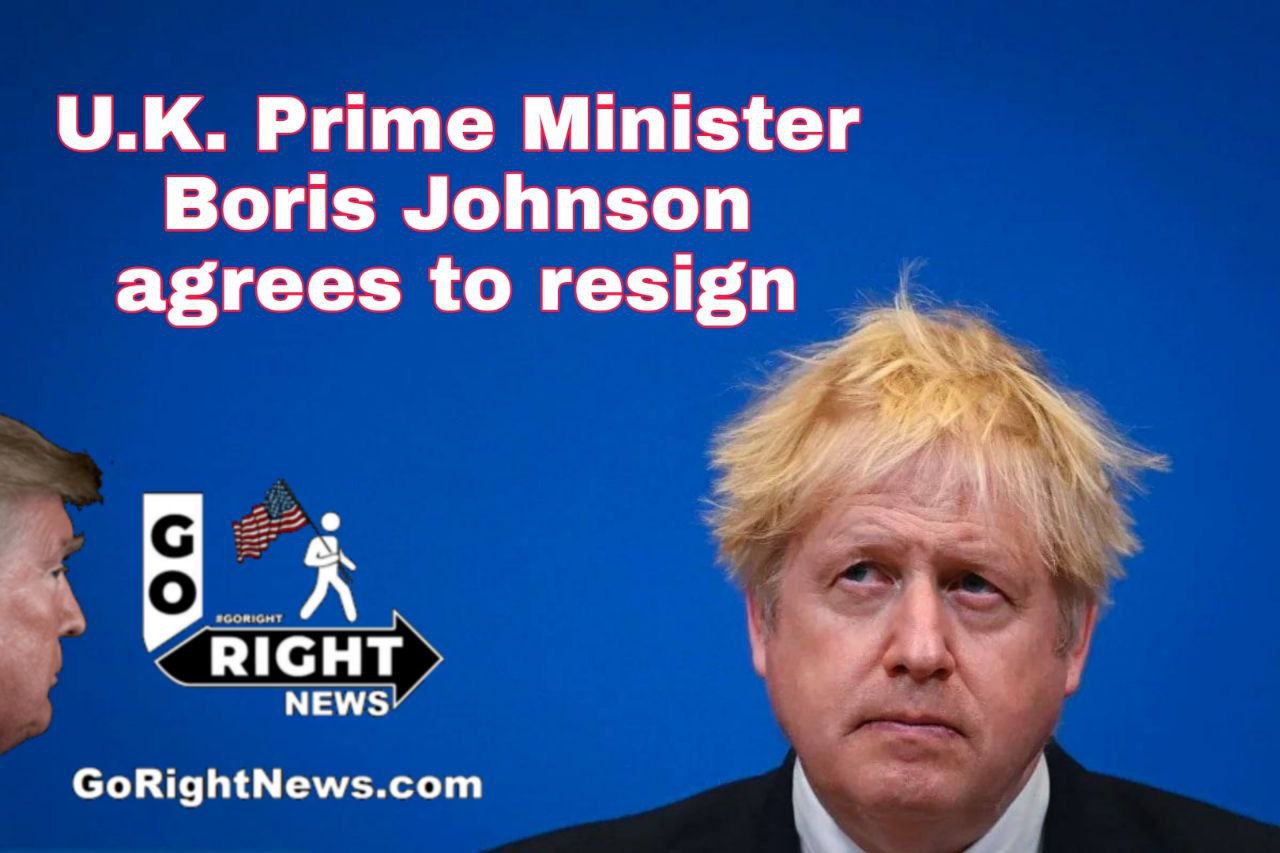U.K. Prime Minister Boris Johnson agrees to resign
Written by Peter Boykin on July 7, 2022
Shared By Peter Boykin – American Political Commentator / Citizen Journalist

British Prime Minister Boris Johnson agreed to resign as Conservative Party leader, the BBC reports.
The expected announcement comes after a historic number of government resignations, triggered by a series of scandals, left Johnson’s position untenable.
Why it matters:
It’s a stunning fall for a prime minister who in 2019 won a historic 80-seat majority on the back of his pledge to take the U.K. out of the EU.
At the time, Johnson’s popularity and the weakness of opposition parties led many to believe he could serve for at least two terms.
But an endless stream of scandals beginning last fall compounded by the Johnson government’s inconsistent explanations has instead seen him ousted in disgrace in less than three years.
The latest:
The BBC and other British media reported that Johnson would announce his resignation.
Johnson hopes to stay on as prime minister until a new party leader is chosen, likely this summer, per the BBC.
“A new prime minister will be in place in time for the party conference in October,” the BBC wrote.
What we’re watching:
Opposition leaders and key members of the Conservative Party are already pressuring Johnson to step down immediately, rather than stay on as caretaker prime minister until the fall.
How we got here:
Johnson faced a no-confidence vote sparked by members of his Conservative Party after he was found to have broken the law by attending several social gatherings during the country’s strict COVID-19 lockdown. He survived the vote, but the “partygate” scandal over the events at No. 10 Downing Street severely damaged his popularity.
He came under renewed pressure to resign after his spokesperson admitted Johnson had been made aware of a sexual misconduct complaint against Conservative MP Chris Pincher in 2019 — but later “forgot” about it and appointed him to a senior government position. Pincher resigned after new allegations were leveled against him.
Those revelations prompted Health Secretary Sajid Javid and Chancellor Rishi Sunak, two of the country’s top Cabinet ministers, as well as dozens of junior ministers to leave their posts, saying they no longer had confidence in Johnson’s leadership.
With so many ministers resigned it was clear Johnson lacked the requisite number of loyal members of Parliament to fully staff his government.
Adding to the drama, the resignations continued to stack up as Johnson publicly testified before a committee of hostile senior MPs during a once-a-year oversight hearing.
Johnson survived his grilling only to find a delegation of loyalist ministers waiting for him at No. 10 Downing Street to inform him that it was time to resign.
But instead of giving in, Johnson doubled down vowing to fight on and daring his own party to bring an unprecedented second vote of no confidence against him, according to British media reports.
He even fired senior Cabinet minister Michael Gove, one of his closest allies who served with him as a figurehead of the 2016 “Vote Leave” Brexit campaign, after Gove called for him to resign.
Now the number of resignations has topped 50.
Nadhim Zahawi, who the prime minister appointed to replace Sunak as chancellor, urged the prime minister to step down.
“You must do the right thing and go now,” Zahawi said in a letter posted to Twitter.
The big picture:
Johnson became prime minister in 2019 after Theresa May resigned over her failure to secure a Brexit deal.
Johnson led the Conservative Party to its biggest election win in decades later that year, and later fulfilled his promise to bring Britain out of the EU.
But Johnson’s tenure has often been chaotic, including public ruptures within his inner circle and allegations of shady dealings by some of his allies.
Then came “partygate,” beginning late last year. The drawn-out scandal outraged the public and led to Johnson becoming the first sitting prime minister to be penalized for breaking the law. As of late June, his approval rating stood at 26%.
Between the lines:
Johnson’s fall follows similar trajectories of previous Tory prime ministers who were ousted from power.
May resigned in 2019 and Margaret Thatcher in 1990, not long after they each survived their own no-confidence votes.
What to watch:
The Conservatives still retain a majority in Parliament, meaning that their next party leader will also assume the role of prime minister just as Johnson did when he replaced May.
A leadership contest will now ensue, but there is no obvious successor given that many of the party’s top politicians remained loyal to Johnson throughout his many scandals.
Among the candidates who have been floated are Sunak, Javid, Sunak’s replacement Zahawi, Foreign Secretary Liz Truss, Defense Secretary Ben Wallace, former Health Secretary Jeremy Hunt, and Foreign Affairs Committee Chairman Tom Tugendhat.
#GoRightNews
Shared by
#GoRightNews https://GoRightNews.com
Each Month GoRightNews Spends Hundreds of Dollars and Hours To Run This Site and Podcast, with no sponsors or ads this comes out of our pockets, if you like what you see consider donating to the podcast. Thanks!
#GoRight with Peter R Boykin
#GoRightNews
Join Peter Boykin on Telegram
Join Peter Boykin on Facebook
Join Peter Boykin on GAB
Support The Podcast and Website
To Donate to the Podcast (NOT THE CAMPAIGN)


